Intro
Discover 7 Brussels sprouts benefits, including cancer prevention, immune boost, and digestive health, rich in vitamins, antioxidants, and fiber, supporting overall wellness and nutrition.
The humble Brussels sprout, often overlooked and underappreciated, is a nutrient-dense superfood that deserves our attention. Packed with vitamins, minerals, and antioxidants, this tiny vegetable has been shown to have numerous health benefits, from reducing inflammation to supporting cancer prevention. As we delve into the world of Brussels sprouts, you'll discover why incorporating them into your diet can have a significant impact on your overall well-being. With their rich, earthy flavor and versatility in cooking, it's time to give Brussels sprouts the recognition they deserve. Whether you're a health enthusiast or a foodie, you'll find plenty of reasons to love this tiny, green gem.
Brussels sprouts are a member of the Brassica family, which also includes broccoli, cauliflower, and kale. They're a cool-season crop, thriving in temperate climates with moderate temperatures and adequate moisture. This hardy vegetable has been cultivated for centuries, with records of its existence dating back to the 13th century in Belgium, where it's believed to have originated. Today, Brussels sprouts are enjoyed worldwide, with the United States, Europe, and Australia being among the top producers. As we explore the benefits of Brussels sprouts, you'll understand why they're a staple in many cuisines and a favorite among health-conscious individuals.
The nutritional profile of Brussels sprouts is impressive, to say the least. They're an excellent source of vitamins C and K, folate, and fiber, making them an ideal addition to a balanced diet. With their high water content and low calorie count, Brussels sprouts are also a great choice for those looking to manage their weight or reduce their risk of chronic diseases. As we dive deeper into the benefits of Brussels sprouts, you'll discover how this tiny vegetable can have a significant impact on your health and well-being.
Introduction to Brussels Sprouts Benefits
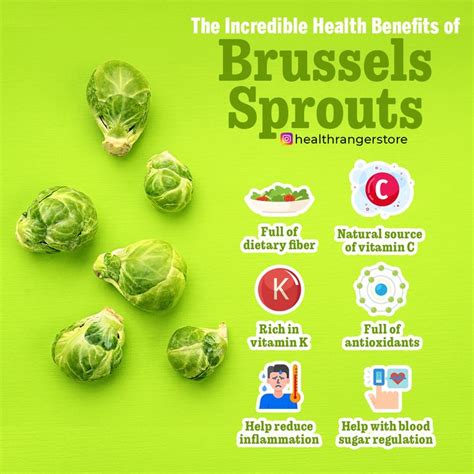
Brussels sprouts are a nutrient-dense food, meaning they provide a high amount of essential vitamins, minerals, and antioxidants while being low in calories. This makes them an excellent addition to a weight loss diet or a healthy maintenance plan. With their high fiber content, Brussels sprouts can help regulate bowel movements, prevent constipation, and support healthy blood sugar levels. The fiber in Brussels sprouts can also help lower cholesterol levels, reducing the risk of heart disease and stroke.
Rich in Vitamins and Minerals
Brussels sprouts are an excellent source of vitamins C and K, folate, and manganese. Vitamin C is essential for a healthy immune system, while vitamin K plays a crucial role in blood clotting and bone health. Folate is vital for cell growth and development, making Brussels sprouts an excellent choice for pregnant women or those looking to support healthy cell division. Manganese, a mineral often overlooked, is essential for enzyme function, wound healing, and bone health.Brussels Sprouts and Cancer Prevention
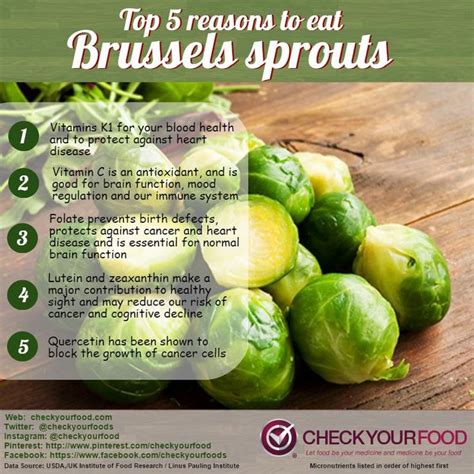
The antioxidants and phytochemicals present in Brussels sprouts have been shown to have anti-cancer properties. The sulforaphane in Brussels sprouts has been found to inhibit the growth of cancer cells, while the indoles and isothiocyanates have been shown to have anti-proliferative effects. This makes Brussels sprouts an excellent addition to a diet focused on cancer prevention. With their high antioxidant content, Brussels sprouts can also help reduce inflammation, which is associated with various types of cancer.
Supports Healthy Digestion
The fiber in Brussels sprouts can help regulate bowel movements, prevent constipation, and support healthy blood sugar levels. A healthy gut microbiome is essential for immune function, and the prebiotic fiber in Brussels sprouts can help feed the good bacteria in the gut. This can lead to a stronger immune system, reduced inflammation, and a lower risk of chronic diseases.Brussels Sprouts and Heart Health
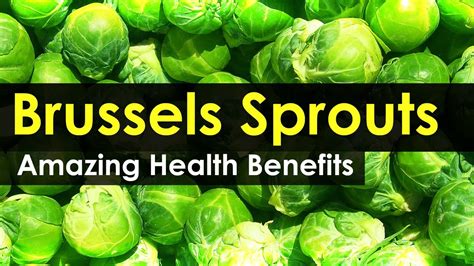
The fiber, potassium, and antioxidants in Brussels sprouts can help support heart health by reducing cholesterol levels, lowering blood pressure, and preventing the formation of blood clots. The folate in Brussels sprouts can also help reduce homocysteine levels, which is associated with an increased risk of heart disease. With their high antioxidant content, Brussels sprouts can also help reduce inflammation, which is associated with various cardiovascular diseases.
May Help Manage Blood Sugar Levels
The fiber in Brussels sprouts can help slow the absorption of sugar into the bloodstream, reducing the risk of spikes in blood sugar levels. This makes Brussels sprouts an excellent choice for those with diabetes or those looking to manage their blood sugar levels. The antioxidants and phytochemicals in Brussels sprouts can also help reduce inflammation, which is associated with insulin resistance and type 2 diabetes.Brussels Sprouts and Brain Health

The antioxidants and phytochemicals in Brussels sprouts have been shown to have neuroprotective effects, reducing the risk of age-related cognitive decline and neurodegenerative diseases. The folate in Brussels sprouts can also help reduce homocysteine levels, which is associated with an increased risk of dementia and Alzheimer's disease. With their high antioxidant content, Brussels sprouts can also help reduce inflammation, which is associated with various neurodegenerative diseases.
Supports Healthy Bones
The calcium, vitamin K, and other minerals in Brussels sprouts can help support healthy bone density, reducing the risk of osteoporosis and fractures. The antioxidants and phytochemicals in Brussels sprouts can also help reduce inflammation, which is associated with various bone diseases. With their high nutrient content, Brussels sprouts are an excellent addition to a diet focused on bone health.Brussels Sprouts and Immune Function
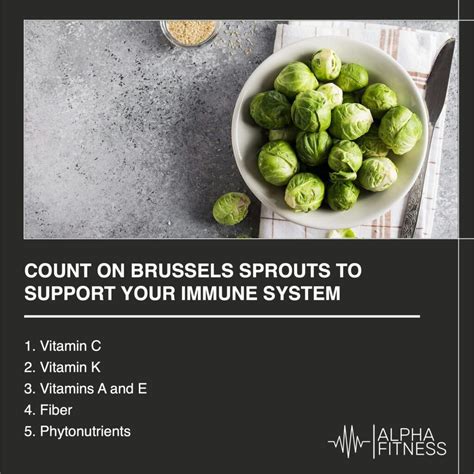
The antioxidants and phytochemicals in Brussels sprouts have been shown to have immunomodulatory effects, supporting the health and function of immune cells. The vitamin C in Brussels sprouts can also help boost the immune system, reducing the risk of illness and infection. With their high antioxidant content, Brussels sprouts can also help reduce inflammation, which is associated with various immune-related diseases.
May Help Reduce Inflammation
The antioxidants and phytochemicals in Brussels sprouts have been shown to have anti-inflammatory effects, reducing the risk of chronic diseases such as heart disease, cancer, and neurodegenerative diseases. The fiber in Brussels sprouts can also help reduce inflammation, supporting healthy gut bacteria and a strong immune system.Conclusion and Final Thoughts
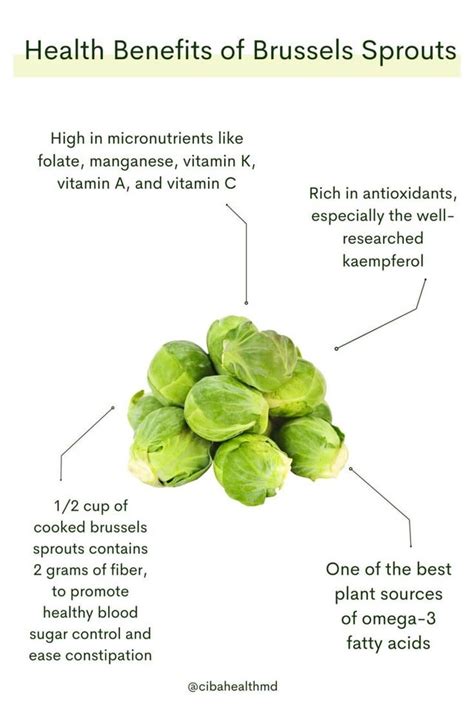
In conclusion, Brussels sprouts are a nutrient-dense superfood that deserves our attention. With their high antioxidant content, fiber, and essential vitamins and minerals, Brussels sprouts can have a significant impact on our health and well-being. Whether you're looking to support healthy digestion, reduce inflammation, or manage blood sugar levels, Brussels sprouts are an excellent addition to a balanced diet. So, go ahead and give Brussels sprouts a try – your body will thank you!
We invite you to share your thoughts and experiences with Brussels sprouts in the comments below. Have you incorporated Brussels sprouts into your diet? What are your favorite ways to prepare them? Share your recipes and tips with us, and let's get the conversation started!
What are the health benefits of Brussels sprouts?
+Brussels sprouts are rich in vitamins, minerals, and antioxidants, making them an excellent choice for supporting healthy digestion, reducing inflammation, and managing blood sugar levels.
How do I cook Brussels sprouts?
+Brussels sprouts can be roasted, sautéed, steamed, or boiled. Simply trim the ends, cut them in half, and cook them in your preferred method until tender.
Can I eat Brussels sprouts raw?
+Yes, Brussels sprouts can be eaten raw. Simply trim the ends, slice them thinly, and add them to your favorite salads or slaws.
Are Brussels sprouts a good source of protein?
+Brussels sprouts are not a significant source of protein, but they are rich in fiber, vitamins, and minerals, making them an excellent addition to a balanced diet.
Can I grow my own Brussels sprouts?
+Yes, Brussels sprouts are relatively easy to grow. Simply plant the seeds in well-draining soil, provide adequate moisture and sunlight, and harvest them when mature.
